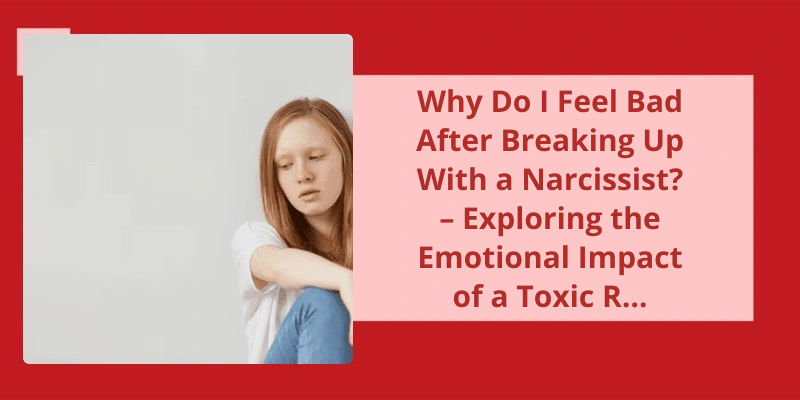Similarly, leaving a narcissist can bring up a lot of complex emotions, including guilt, shame, doubt and confusion. In many cases, people who’ve been in relationships with narcissists may feel like they're the one to blame for the relationship ending, even though it was the narcissist's behavior that led to the break- up. They may feel as though they've failed in some way, or that they're not worthy of being loved. This kind of thinking can lead to a lot of self-doubt, anxiety and depression. It's important for people who’ve experienced a relationship with a narcissist to seek support, both from friends and family, and from mental health professionals who can help them work through these difficult emotions and begin to rebuild their lives.
Are Breakups Hard for Narcissists?
However, these offers of change are often empty and simply a tactic to maintain control over the situation and avoid facing their own flaws. Narcissists have a deep fear of abandonment and rejection, so a breakup can trigger intense feelings of insecurity and vulnerability. They may struggle to move on and let go of their ex, as they view their partners as extensions of themselves rather than individuals with their own autonomy and desires.
The loss of a romantic partner can trigger feelings of inadequacy and insecurity, leading them to engage in even more grandiose and attention-seeking behaviour. They may also become more manipulative and exploitative in their relationships, as they desperately seek to regain a sense of control and power.
If you’re considering ending a relationship with a narcissistic partner, it’s important to prioritize your own emotional well-being and seek support from trusted friends and family members. Therapy can also be helpful in processing the complex emotions that may arise during and after a breakup with a narcissist.
How to Recognize Narcissistic Behavior in a Partner Before Entering a Relationship.
There are a number of warning signs or red flags that can indicate if someone has narcissistic tendencies. These include an excessive focus on themselves, a lack of empathy for others, a need for constant admiration and attention, and an unwillingness to take responsibility for their actions. It’s important to keep an eye out for these behaviors before entering into a romantic relationship with someone.
It’s important to note that everyone’s healing process is unique and there’s no set timeline for recovery. However, seeking support from a therapist or support group can be helpful in navigating through the aftermath of leaving a narcissistic relationship. Remember to be gentle with yourself and celebrate small victories along the way.
How Long Does It Take to Feel Better After Leaving a Narcissist?
Leaving a narcissist can bring up a wide range of emotions and it’s important to give yourself the time and space to process these feelings. You may experience feelings of sadness, anger, loneliness and even depression before you start to feel better. Remember that healing isn’t linear and there will be ups and downs along the way.
One important step in the healing process is to seek professional help. A therapist or counselor can provide you with the tools and support you need to work through the trauma and regain control of your life. You may also find comfort in talking to others who’ve been through similar experiences, either through support groups or online communities.
During this time, it’s also important to take care of yourself physically. Make sure to exercise regularly, eat a balanced diet, and get enough sleep. Engaging in activities that you enjoy, such as hobbies or spending time with friends and family, can also help to boost your mood and keep you motivated.
As you start to regain your sense of self and rebuild your life, it’s important to set boundaries with the narcissist. This may mean cutting off contact entirely, or limiting interactions to strictly necessary matters. It’s also okay to say no to the narcissists demands or behavior that makes you uncomfortable. Remember that you’ve the right to prioritize your own well-being.
Ultimately, the journey to recovery is different for everyone, but with patience, self-care, and the right support, you can heal from the effects of narcissistic abuse. Dont be afraid to reach out for help and take time to focus on yourself. Remember that you deserve to be treated with love, respect, and kindness.
How to Recognize the Signs of Narcissistic Abuse and Get Out of the Relationship
Recognizing the signs of narcissistic abuse involves paying attention to how the other person treats you and how it makes you feel. Red flags include constant criticism, manipulation, gaslighting, and belittling behavior. If you suspect you’re experiencing narcissistic abuse, it’s important to seek help from a trusted friend or professional. Leaving a narcissistic relationship can be difficult, but setting boundaries and seeking support can help you take steps towards healing and finding a healthier relationship.
Source: How To Recover From Narcissistic Abuse
It can be difficult to feel like you’re the only person going through something, especially when those around you can’t relate. But when it comes to leaving a narcissist, feelings of loneliness and isolation are common. While this may offer little solace, it’s important to know that you’re not alone in this experience and that there’s hope for healing.
Why Do I Feel So Alone After Leaving a Narcissist?
Narcissistic abuse survivors commonly experience a wide range of emotions after leaving a narcissist, including anxiety, fear, anger, and depression. These feelings may be amplified by the fact that survivors may feel like they’ve lost a part of themselves while in the relationship, leaving them feeling unsure of who they’re without their former partner. This sense of loss and uncertainty can contribute to feelings of loneliness, as survivors struggle to find a sense of identity and connection with others.
Ultimately, the healing process after narcissistic abuse requires survivors to confront a wide range of emotions and experiences. This can be a difficult and isolating process, as survivors may feel like they’re navigating their journey alone. However, it’s important to remember that there are many others who’ve gone through similar experiences and who can offer support and guidance. Building a strong support network and seeking out resources can help survivors feel less alone and more connected as they move through the healing process.
Conclusion
On the other hand, individuals leaving narcissists often experience guilt because of the manipulative tactics employed by the narcissist to make them feel responsible for everything that went wrong in the relationship. This guilt may stem from the feeling that they should have done more, or that they weren’t good enough to make the relationship work. It’s important to acknowledge these feelings and understand that they’re a normal part of the process of healing and moving forward. Seeking support from friends, family, or a therapist can help individuals process these emotions and regain their sense of autonomy and self-worth.






